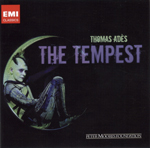Christina Courtin Christina Courtin Nonesuch 254652-2
- Performance:

- Sound:


This striking, eponymously titled album from singer/songwriter Christina Courtin introduces an enigmatic, deep-thinking artist who first disarms you, then ropes you in. Courtin’s seductive, little girl voice comes off as almost naïve in the opening track, “Green Jay,†but turns surprisingly dark and pleading in “Laconia.†Another of the ten tracks, “Rainy,†features an extraordinary, heart-tugging intro played by Brooklyn Rider, a string quartet known for performing with Yo-Yo Ma’s Silk Road Ensemble. Courtin’s connection with Ma extends back to 2004, when the Juilliard-trained violinist first worked with Ma and his Silk Road Ensemble at a Carnegie Hall Professional Training Workshop. After Ma learned that Courtin’s distinctly non-classical singing had earned her a loyal following at Juilliard, he invited her to sing in one of the ensemble’s concerts in Carnegie’s Zankel Hall. Singing in a workshop with multi-faceted soprano Dawn Upshaw led to performing with her, violin performances with composer Osvoldo Golijov, and an introduction to the Nonesuch label. On this CD, it’s the voice, and Courtin’s deceptively simple, amazingly deep songwriting that command attention. Courtin arranged most of the strings; the fabulous supporting musicians, including pianist Rob Burger of the Tin Hat Trio, did the rest. You will not forget this album.
Jan Schmidt-Garre and Marieke Schroeder Aida’s Brothers & Sisters:Black Voices In Opera And Concert Arthaus Musik DVD NTSC 101 367
- Performance:

- Sound:

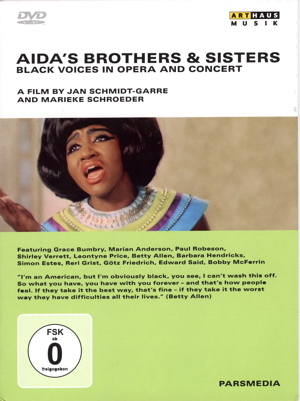
Released in 2000, this just-transferred-to DVD features historic performances by and interviews with many of the pivotal black classical singers of preceding decades. They, Bobby McFerrin, and several notable historians and stage directors have quite a story to tell. There’s outstanding footage of the great contralto Marian Anderson, whom First Lady Eleanor Roosevelt invited to perform at the Lincoln Memorial in 1939 after the Daughters of the American Revolution (DAR) barred her from singing in Constitution Hall. In her footsteps comes one of San Francisco’s favorite divas, soprano Leontyne Price, who followed Anderson to the stage of the Metropolitan Opera in 1961. Forty-three years after Anderson was barred from Constitution Hall, Ms. Price sang like a queen before the stuffy DAR. The way she ends her aria could serve as an object lesson of how to send audiences into delirium.
Throughout the DVD, artists of major stature discuss all the glories, paradoxes, indignities, contradictions and triumphs black artists continue to face in the classical arena. The vocal excerpts are glorious – Jessye Norman’s snippet from Richard Strauss’ opera Ariadne auf Naxos is alone worth the price of admission, and Ms. Price and Paul Robeson are incomparable – and the oft-provoking insights into racial stereotyping are essential.
“If you are not bothered by [a white singer portraying an Ethiopian or Moor], then why would be bothered by the fact that I’m an African-American singing the role of a French nobleman?†asks tenor George Shirley. Ten years after the great Shirley Verrett declared, “We’re going backward,†a weakening of laws fostering equal opportunity for all makes this DVD more relevant than ever.
Tsabropoulos, Lechner, & Gandhi Melos ECM 2048
- Performance:

- Sound:

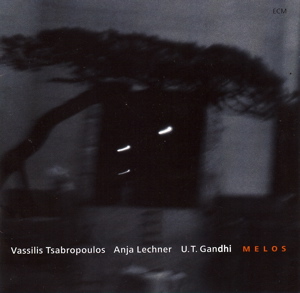
Where does the mystical music of Georges Ivanovitch Gurdjieff end and that of pianist/composer Vassilis Tsabropoulos and his collaborators, cellist Anja Lechner and drummer U.T. Gandhi, begin? It’s hard to tell on this mesmerizing CD that intersperses improvisations on three of Gurdjieff’s works with original compositions by Tsabropoulos.
Perhaps I get ahead of myself. Greek philosopher/seeker/spiritual teacher G.I. Gurdjieff (1866?-1949), author of several oft-confounding metaphysical classics on self-transformation, taught his disciples “sacred gymnastics†— movements designed to alter or heighten attention. As the students practiced at Gurdjieff’s Institute for the Harmonious Development of Man, their teacher would spontaneously tap out rhythms. After humming or whistling an accompanying melody, some based on sacred music he had heard on his journeys to various spiritual centers, he would turn to his amanuensis, the Russian pianist/composer Thomas de Hartmann, who would attempt to transcribe them in Western notation.
In the 1950’s, Hartmann recorded and published a number of the Gurdjieff/Hartmann collaborations written between 1925 and 1927. These classic LPs in turn inspired a host of young artists, not the least of whom was Keith Jarrett. Now, as a follow-up to Tsabropoulos and Lechner’s first ECM disc of improvisations on the Gurdjieff/Hartmann collaborations, Tsabropoulos has gone a step farther, writing works in the spirit of Gurdjieff. This beautifully recorded music possesses a marvelous multi-dimensionality that invokes higher planes.
Sergei Rachmaninoff: Rachmaninoff Plays Rachmaninoff Zenph Re-Performance Sony Masterworks 88697-48971-2
- Performance:

- Sound:

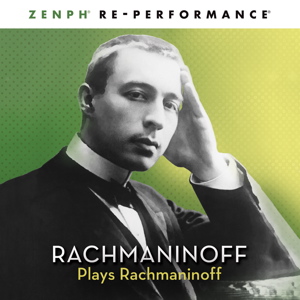
Composer and master pianist Sergei Rachmaninoff waxing romantic from beyond the grave? As wax museum melodramatic as that may sound, Zenph Studios’ computer re-creation of 13 of Sergei Rachmaninoff’s short ’78 recordings, set down between 1921 and 1942, makes it sound as though they were recorded yesterday. All dynamics, pedalings, and subtle shadings have been preserved, reproduced on a 1909 nine-foot Steinway D grand piano of the kind and vintage Rachmaninoff likely played.
Rachmaninoff’s performances of his own works and transcriptions find the genius in top form. He whirls through his transcription of Rimsky-Korsakov’s Flight of the Bumblebee with a remarkably light, even touch; enlivens his arrangement of Mendelssohn’s Scherzo from A Midsummer Night’s Dream with elfin, whirling whimsy; and plays his own well-known Prelude in C-sharp minor, Op. 3, No. 2 to memorable effect without the heavy touch and excessive use of pedal and rubato employed by some “romantic†pianists.
In an unabashed pitch to audiophiles, i.e. us, Sony has chosen to feature each re-performance twice: once in stereo, a second time in binaural stereo for the “ultimate headphone experience.†IPod listeners – certainly those who transfer the tracks at full CD quality rather than in mp3 mode, have invested in good quality earphones, and bypass the built-in DAC in favor of a higher quality unit by using a Wadia docking station or the like – and headphone aficionados will go into heat; others will lament that there are not 26 different pieces on the CD. But what we do have is marvelous.
Patrick Beckman Big Muddy: Suite for Clarinet & Piano Navona Records NV5815
- Performance:

- Sound:

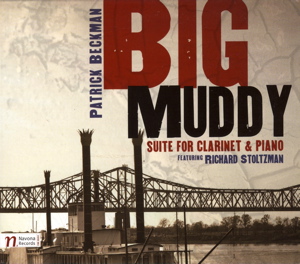
Written for the remarkably versatile, Grammy-award winning American clarinetist, Richard Stoltzman, the Big Muddy Suite is a celebration of the various musics of the Mississippi Basin. The irresistibly swinging suite that blends jazz, r&b, classical, and more than a hint of boogie-woogie into a marvelously melodic mix. A simple look at the movement titles – Memphis Nightrain, Bayou Lament, St. Louie Thunder, Natchez Hymn/Gigue, and Catfish Rondeau – hints at the musical range of the 40-minute, uninterrupted excursion. The duo of Stoltzman and pianist/composer Beckman improvised like crazy in the studio, producing a recording of great spontaneity and verve. St. Louie Thunder will have you toe tapping, while Natchez Hymn will induce a more ruminative mood until it breaks into its jolly gigue. The final Catfish Rondeau begins upbeat, seguing into a heart-touchingly nostalgic, bluesy note before swinging to its conclusion. The enhanced CD includes PDF study scores of the music, two low-resolution QuickTime videos whose sound refused to come through on my iMac, and a small picture gallery. But the music’s the thing, and it’s a joy.
The Aureole Trio The Beautiful Beatles E1 Entertainment/Koch KIC-CD-7755
- Performance:

- Sound:

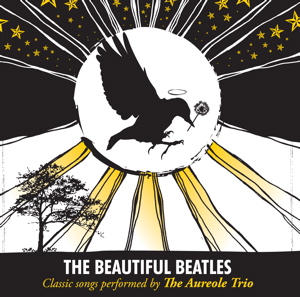
Just back from Cuba, where I participated in the 40th Anniversary Venceremos Brigade, I can’t get the Beatles out of my mind. There’s no easy way to explain Cuba’s fascination with the Fabulous Four, but 40 years after Spanish renditions of Beatles songs were blasted between sugarcane cutting excursions on the first Venceremos Brigade, the country remains under the Beatles’ spell. You may fall under it (again) as well, when you hear these lovely, arrangements of Beatles tunes for the flute, viola, and harp of the Aureole Trio. The intros to the 15 songs are quite inventive, the music approached with uncommon gentleness.
No, you won’t hear the Beatles’ most rocking tunes. But in these women’s hands and hearts, “Here Comes the Sun,†“Norwegian Wood,†“A Day in the Life†(with Gil Goldstein on accordion), “Let It Be†(with its intro from Pachelbel’s Canon), “Yesterday,†and ten other melodies captivate anew. Categories of old/new, classical/pop, and all the rest fall away, as the trio named for “a halo; a light or luminous area surrounding a celestial body†takes you on a voyage of airy enchantment. Beatles lovers who think rearrangements of Beatles tunes for a classical trio of this nature could not possibly succeed will be pleasantly surprised.


